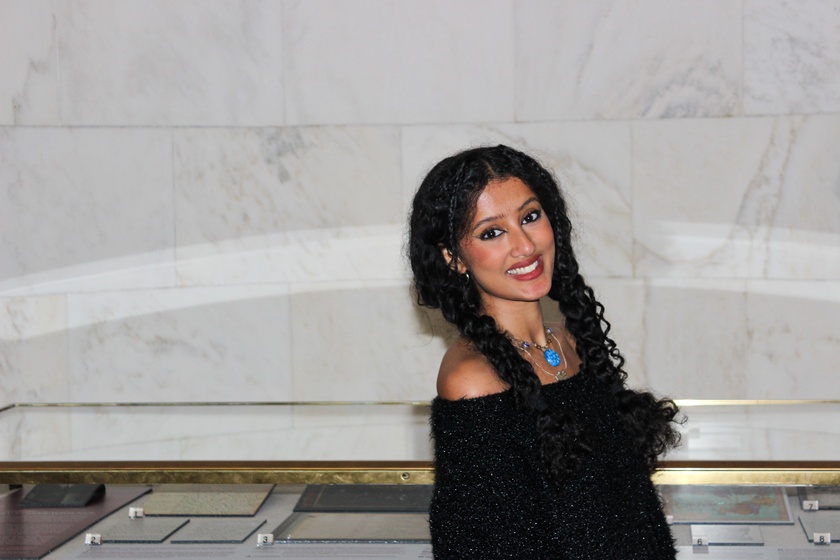{shortcode-26d6b4e13ca7cb220375e3b8eeddb59a5b435e35}
{shortcode-e64d65eabc2c8945c17364f3d09655b667e30e03}aila A. Nasher ’25 didn’t stay up late the night of the U.S. presidential election. She was in immense pain from breaking her spine earlier in the semester, and she went to bed before the results for any battleground state were called. Not to be mistaken, the election was on her mind: She woke up at 5:16 a.m. to see Donald Trump leading Kamala Harris in the Electoral College. A few minutes later, he won the state of Wisconsin, pushing him over the 270 electoral votes needed to recapture the presidency. Like many Harvard students, Laila was initially shocked.
“But when you sit and analyze why this happened, it’s really not shocking,” Laila reflects. “If you talk to the average low-income, paycheck-to-paycheck American who feels completely disillusioned by the Democratic Party, it makes sense.”
The weekend before the election, she had organized a group of Spanish and Arabic-speaking students to canvas for Harris. “Something that I heard from a lot of these students was that they’re door-knocking in communities that didn’t really hear much from the campaign,” she says.
Laila’s interest in political organizing is deeply personal. She grew up in a socially conservative Yemeni-American community in Detroit where most young people did not attend college. Her peers felt that they had few opportunities for the future: Boys joined gangs, girls married as teenagers.“I had grown up in a reality where scarcity was all you knew, and where, essentially, your life’s path was written out for you before you were even born,” Laila says.
Laila arrived at Harvard in the fall of 2020. In Detroit, she had gone to a charter high school, where 30 out of 33 teachers were substitute teachers and extracurricular activities did not exist. Laila did not feel ready for Harvard. “I was thrown into this environment which was so different from what I was used to,” she explains. After a month-and-a-half, she took a leave of absence.
When she returned one year later, Laila felt more prepared to face the challenge of navigating Harvard as a first-generation, low-income freshman. She began connecting with other first-generation students, leading her to realize that the University was not doing enough to support FGLI students in their transition from high school to college. She brought her concerns to administrators, and found a gap between the administration’s efforts and students’ needs. Laila made it her goal to institutionalize better resources for FGLI students on campus.
In Fall 2022, she helped found First Generation Visibility Week and the FGLI Welcome Ceremony in collaboration with administrators. Laila also makes an effort to mentor FGLI students one-on-one. “My idea of leadership is centered around being the person you once needed but did not have,” she says, calling her mentorship work “one of the most fulfilling things I’ve ever done.”
Inspired by the success of her FGLI programming on campus, Laila began organizing within her community in Michigan. She held bazaars for migrant women, advocated for public education, and strove to make herself visible as a Yemeni woman. She wanted to show her community that the scarcity they grew up with was not normal. “Once you realize the injustice that was done to you, you then start thinking of ways to fight back against it,” she says. In recent years, she’s seen her community become more politically engaged — especially the women, she notes.
Following graduation, Laila plans to attend law school, focusing on education law through the lens of civil rights. Afterward, she hopes to develop education policy in communities with high poverty rates. She once thought she would work for the Department of Education before starting law school, but thinks that with Trump as president, the department will no longer have enough funding for that to be possible.
“The results of the election reminded me of why I do the work that I do because of the direct threat we’re going to see with our education system,” she says. “It may not impact a lot of people at this University, but it will impact the people within my neighborhood. It will impact people in the neighborhoods that don’t make it to places like Harvard.”
Though she hopes for sweeping change in the American education system, Laila has no plans to run for federal office herself. For one, she was born in Yemen; though she’s eligible to run as a natural-born citizen, she jokes that her country of origin would deter voters. She also doesn’t see the federal government as the best place to make a change in education policy. “Only 8 percent of K-12 education is funded at the federal level,” she explains. “A majority of the work that I will be doing is on a state and local level.”
In the long term, she wants to see education legally recognized as a civil right. Instead of letting the results of the presidential election deter her from her goal, she has used them to further fuel her advocacy work. Laila’s motivations parallel those of her generation: characterized as fatalistic yet fighting hard for their future. “I see Gen Z doing a lot of work, like leading protests and finding new forms of accessible organizing,” she says. “I am hopeful for the future of a politicized and active Gen Z.”
— Magazine writer Vivian W. Rong can be reached at vivian.rong@thecrimson.com.


